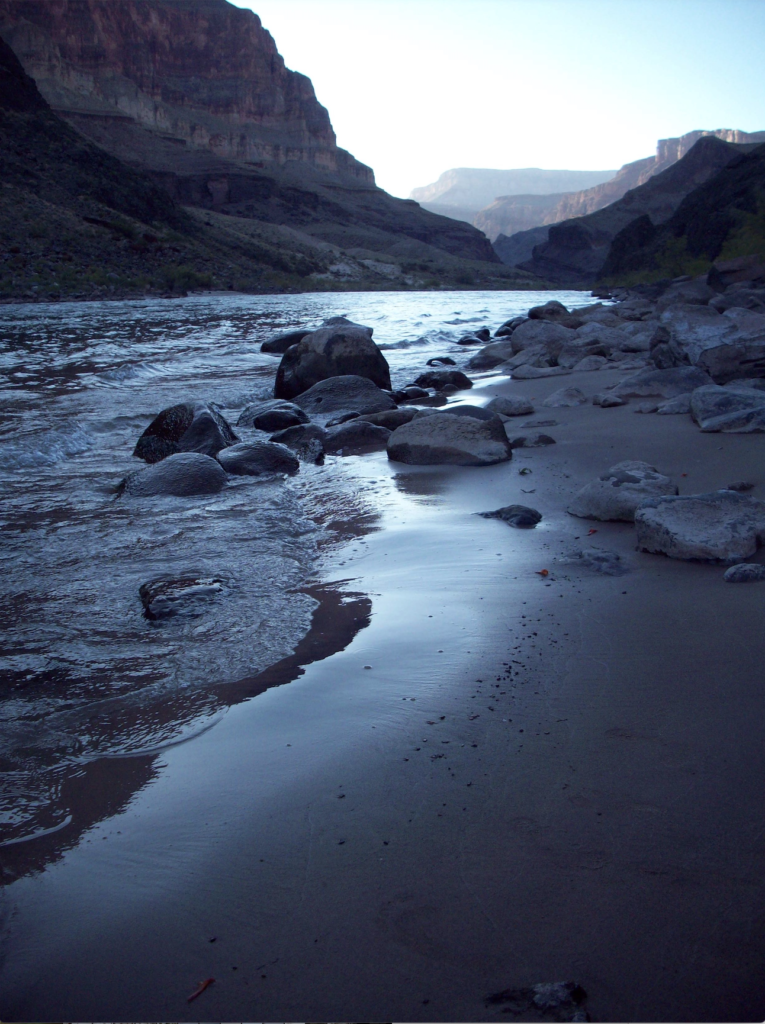Backbacking and Gigging
I recently went on my first backpacking trip. I’ve done plenty of car camping and festival going, so I was already comfortable enough being relatively uncomfortable—no running water, no temperature control, thin walls, and packing in what you need. But, I was not used to packing everything I need for a weekend, let alone 6 days and 5 nights, on my back. In the Grand Canyon. In a remote corner of the canyon where you might run into a handful of people. Where GPS mostly works and cell service is out of the question. Where temperatures ranged from upper 40’s to high 90’s. Where caching water was essential. Oh, did I mention I hadn’t really walked around with my fully loaded, 45-pound pack? Yeah…
To say the 31.6 mile trip was challenging is like saying playing the upright bass is like playing a huge violin. While much of it was simply spectacular, and it certainly was rewarding, it was one of the most difficult things I have done yet in my life. While on this adventure, I had some time to think about some things while putting one foot in front of the other. Here are a few insights I had about the parallels between backpacking and gigging.
90% will never be 100%
 On day 1 of our trip, my boyfriend and I hiked some 13 hours to go 9.5 miles to our first camp. We dramatically underestimated both water and time required to get there safely (and we started hiking at dawn with 9 liters of water between us!). The final 1.5 miles were rough to say the least—my right knee and foot were aching and each step was painful. We were both exhausted and our nearly running out of water before reaching Thunder Spring was both humbling and frightening, effectively ending the chipper, enthusiastic, curious spirit of the morning. As we trudged the final stretch in the dark (we hadn’t planned on night hiking), I thought of our resolve to make our itinerary—we had no plans to just stop on or beside the trail to set up camp, we would make it to Upper Tapeats, by god. That resolve (and our concern that our neighbors would be looking for us) got us there. And, truthfully, there just wasn’t anywhere else to camp on that trail!
On day 1 of our trip, my boyfriend and I hiked some 13 hours to go 9.5 miles to our first camp. We dramatically underestimated both water and time required to get there safely (and we started hiking at dawn with 9 liters of water between us!). The final 1.5 miles were rough to say the least—my right knee and foot were aching and each step was painful. We were both exhausted and our nearly running out of water before reaching Thunder Spring was both humbling and frightening, effectively ending the chipper, enthusiastic, curious spirit of the morning. As we trudged the final stretch in the dark (we hadn’t planned on night hiking), I thought of our resolve to make our itinerary—we had no plans to just stop on or beside the trail to set up camp, we would make it to Upper Tapeats, by god. That resolve (and our concern that our neighbors would be looking for us) got us there. And, truthfully, there just wasn’t anywhere else to camp on that trail!
In college, I was determined to make A’s, but I let myself make 90’s in order to get those A’s. Better was better, of course, but I got in the habit of aiming for 90, not 100.
On a gig, you don’t drive 90% of the way to the venue. You don’t play 90% of the set. Tickets or merchandise don’t go for 90%. And, when I have an off night, I still give it my all. A friend recently remarked on what a difference it has made in her practice to work on mastering that final 10% of a piece, be it tempo, technique, comfort, stage presence, or really feeling like you own that tune (in the way that you personally play it). We’ve all witnessed bands that are really good, but that extra 10% separates them from the next level.
90% doesn’t get you to camp.
One foot in front of the other
We’ve all heard this so many times I’m not sure we even think about it. Nothing like a difficult trail to really sink that message in. There’s just no other way to do it. Start looking too far ahead and you could miss a cairn, or twist an ankle. Look too far ahead and get discouraged and want to give up. Focusing on the present helped me to navigate carefully and to realize I did have the energy and focus for what was immediately being asked of me. I was reminded often, as we gazed at different rims of inner canyons and the vast expanses of otherworldly sandstone layers that “a journey of 1,000 miles begins with a single step” (Lao Tzu).
Especially when I am nervous during a show, I might find myself trying to remember lyrics of a song coming up in the setlist. You know what that does? Distract me from the song I’m playing and make me question if I know lyrics, adding to my anxiety. This is not breathing into the note at hand or living inside the music being made in the moment.
Resilience is not built on good times

“All of my wisdom came from the toughest days/never learned a thing being happy” is the opening line of the Wood Brother’s tune “Happiness Jones”. And, yep, that about sums up the hard-won lessons—and triumphs—of life.
I can read and research, but when it comes down to it, I, like most people, just have to go through the ol’ school of hard knocks to really have a lesson sink in. Going in to this trip, I had it in my mind my pack would weigh in at around 35 pounds, and, for some reason, I also thought the trip was closer to 20 miles, not over 30. Being extra careful on food, and just not knowing what we really needed, my pack was a hefty 45 pounds, about 35% of my body weight. And, although my big toes still have streaks of black and purple a month later from that heavy pack and miles of downhill, I now know 1) I can do it, and 2) how to do it more efficiently.
There have been some bad gigs in my 20 + years of doing live shows. It’s been so hot I worried the hide glue holding my bass together would start melting. It’s been so cold I’ve felt like I was playing with hooves. Audiences have ignored us, or looked like they were physically in pain. There have been 5 people in an audience we drove miles for and expected closer to 100. We’ve been ill or so emotionally wrecked it’s a wonder any of us, let alone the band as an entity, survived. We’ve had to pay the venue when we didn’t make enough in ticket sales to cover rent. But, you know what, we lived through it, learned a few lessons, and kept going.
Good gear is worth its weight (or, the weight saved!) in gold
I will say, with our over a year’s prep for this backpacking trip, we were able to get some good gear. Only a few items were not up to par. Good boots, good packs, good clothes, good food…we relied on our gear, and it helped us not only enjoy our time, but helped us survive. Moisture wicking, quick drying clothing made miles across Surprise Valley in the direct sun or crossing Tapeats Creek possible. Boots with aggressive tread, padding, and good ankle support were necessary for traversing so many rocks with so much weight. Food supplemented with hemp hearts, chia seed and reishi mushroom powder helped our dehydrated meals go further.
On stage, in the studio, at camp, it is no different. A good instrument pays you back time and time again. They are easier to play, sound better, and increase in value. I’ve been lucky to have parents who have always known the value of good instruments and got the best they could for me and my brothers even before we showed an interest in playing. Getting a cheap beginner instrument to see if someone is really interested in playing may seem like a good idea, but, in my experience, has only served to discourage many budding musicians.
Change your world, change your perspective

When knees would start to refuse to bend, a cramp would start, or the heat and distance would start to get to me, I had a choice. When I focused on the discomfort, it was not only worse, but other parts of my body felt worse and my mood blackened. If, instead, I was grateful for and focused on what was not hurting, or feeling better, I was encouraged, and, whaddya know, all of me felt better.
It’s the shaking off of a bandmate’s bad mood, missed notes, a lackluster solo, or lukewarm response. It’s being grateful I can and do play music, that I’m able to travel and meet wonderful people, that I have an outlet for creativity, that I have a good instrument, that there are more songs to create and to learn…and more trails to hike.
We’re all in this together
It seems especially in these times—pandemic, election year, unrest—it’s good to be reminded that we humans are more alike than dissimilar, and to experience genuine brotherhood. On the trail, most folks say hello, even if they are in pain and exhausted. I found that most were eager to share expertise, guidance, and camaraderie. Rafters and backpackers alike reveled in the beauty all around us and in our luck to share in such a unique experience. Letting folks know of trail conditions or cool sights not marked on the map was the norm. We didn’t talk politics, religion, or have any clue what our bank accounts looked like. We were all sharing the canyon experience, and happy to help each other out.
One of my great joys in playing music is its magic in bringing people together. Particularly in the acoustic music world, it seems skill level, age, nationality, even language is of little consequence. We all love music—playing it, listening to it, writing it—and we’re happy to share in knowledge and that instant connection.